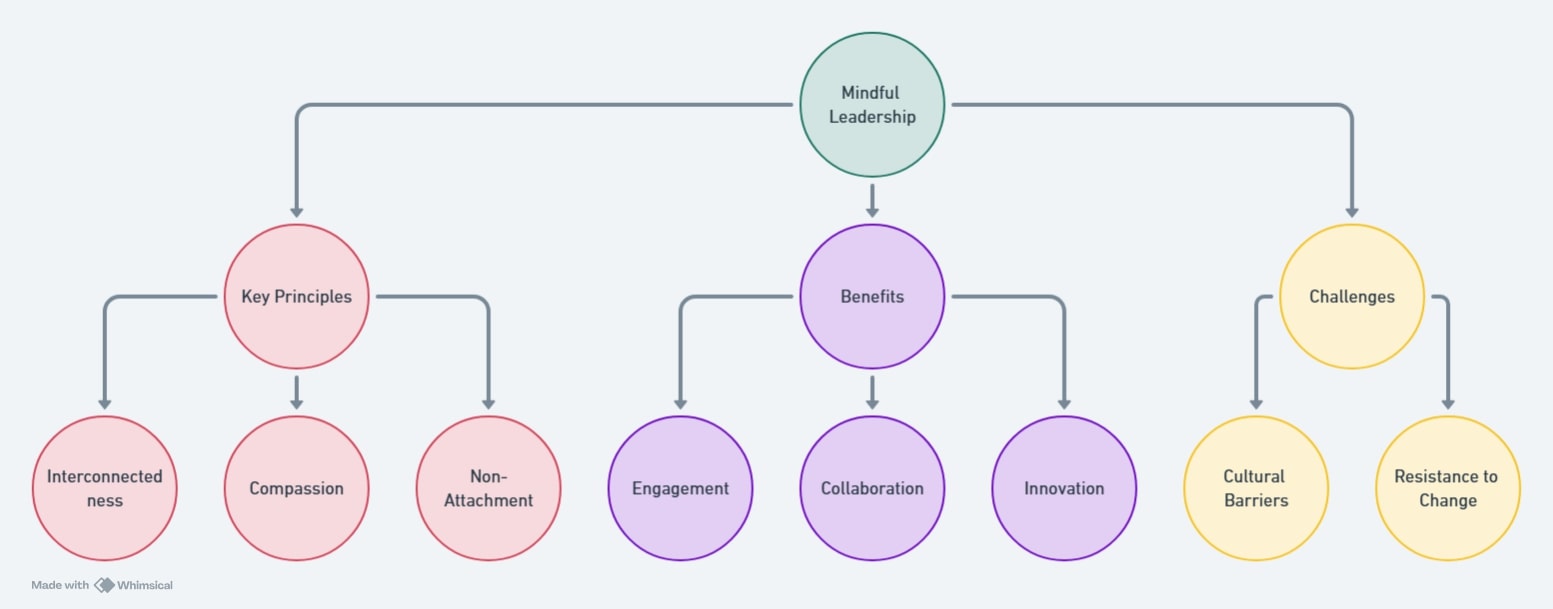Mindful Leadership: Integrating Buddhist Ethics into Contemporary Organizational Management
คำสำคัญ:
Mindful Leadership, Buddhist Ethics, Organizational Management, Ethical Decision-Making, Sustainabilityบทคัดย่อ
This paper, titled "Mindful Leadership: Integrating Buddhist Ethics into Contemporary Organizational Management," explores the profound influence of Buddhist ethical principles on modern leadership practices. It examines how mindfulness, compassion, and ethical decision-making can transform organizational management by fostering a culture of trust, collaboration, and sustainability. Drawing on the Four Noble Truths, the Eightfold Path, and the principles of interconnectedness and non-attachment, the study demonstrates how these teachings address complex challenges in dynamic business environments. The research highlights the role of mindful leadership in enhancing employee engagement, improving team communication, and promoting ethical decision-making while reducing workplace stress and burnout. Through case studies of successful leaders and practical examples, the paper illustrates how integrating Buddhist ethics fosters innovation, strengthens organizational reputation, and ensures long-term sustainability. Ultimately, this study advocates for the adoption of mindful leadership as a transformative approach to align personal values with professional practices, creating resilient and ethical organizations in an ever-changing global landscape.
เอกสารอ้างอิง
Arvind Mallik, D. M. (2024). Unveiling Ancient Wisdom: The Bhagavad Gita’s Influence on Modern Management and Leadership. Retrieved from https://www.semanticscholar.org/paper/5e7b6ada45f2572123cd8525826ca0c960d0fde4
Ammara, U., Rasheed, K., Mansoor, A., Al‐Fuqaha, A., & Qadir, J. (2022). Smart Cities from the Perspective of Systems. Systems, 10, 77. https://doi.org/10.3390/systems10030077
Athanasios, D., & Mitsea, E. (2020). The Triangle of Spiritual Intelligence, Metacognition and Consciousness. International Journal of Emerging Spirituality, 8, 4. https://doi.org/10.3991/ijes.v8i1.12503
Baer, R. A., Bono, J. E., Brewer, J. A., Brown, K. W., Duffy, M. K., Glomb, T. M., ... & Lyddy, C. (2015). Contemplating Mindfulness at Work: An Integrative Review. Retrieved from https://core.ac.uk/download/80496021.pdf
Burton, N., & Vu, M. C. (2020). Mindful Reflexivity: Unpacking the Process of Transformative Learning in Mindfulness and Discernment. Sage Publications. Retrieved from https://core.ac.uk/download/286027767.pdf
Clarke, S., & Cooper, C. (2004). Managing the Risk of Workplace Stress. Routledge. Retrieved from https://play.google.com/store/books/details?id=z1CBAgAAQBAJ&source=gbs_api
Dhiman, S. K., Kumar, V., & Modi, S. (2019). Celebrating Diversity through Spirituality in the Workplace: Transforming Organizations Holistically. ValpoScholar. Retrieved from https://core.ac.uk/download/216809948.pdf
Drigas, A., & Mitsea, E. (2020). The Triangle of Spiritual Intelligence, Metacognition and Consciousness. International Journal of Emerging Spirituality, 8, 4. https://doi.org/10.3991/ijes.v8i1.12503
Dwivedi, Y. K., Hughes, L., Kar, A. K., Baabdullah, A. M., Grover, P., Abbas, R., ... & Wade, M. (2021). Climate Change and COP26: Are Digital Technologies and Information Management Part of the Problem or the Solution? International Journal of Information Management, 63, 102456. https://doi.org/10.1016/j.ijinfomgt.2021.102456
Hepburn, S. J., Carroll, A., & McCuaig, L. (2021). The Relationship between Mindful Attention Awareness, Perceived Stress and Subjective Wellbeing. International Journal of Environmental Research and Public Health, 18, 12290. https://doi.org/10.3390/ijerph182312290
Kawi, I. C., & Pontjoharyo, W. (2023). Integrating Buddhist Principles Into Management Control Systems: A Cattari Ariya Saccani Approach. Journal of Buddhist Ethics, 5, 146–161. https://doi.org/10.34306/att.v5i2sp.326
Neal, J., Altman, Y., Mayrhofer, W., Gill, R., Zsolnai, L., Pavlovich, K., ... & Dana, L. P. (2022). Workplace Spirituality. https://doi.org/10.1515/9783110711349
Vu, M. C., & Burton, N. (2023). Beyond the Inclusion–Exclusion Binary: Right Mindfulness and Its Implications for Perceived Inclusion and Exclusion in the Workplace. Journal of Business Ethics, 191, 147–165. https://doi.org/10.1007/s10551-023-05457-2
Weinland, K. (2023). Intercultural Communication. https://doi.org/10.22488/okstate.23.000006
Yochanan, A., Altman, Y., & Neal, J. (2022). Extending the Transformative Potential of Mindfulness Through Team Mindfulness Training. Retrieved from https://doi.org/10.3389/fpsyg.2022.867110

ดาวน์โหลด
เผยแพร่แล้ว
รูปแบบการอ้างอิง
ฉบับ
ประเภทบทความ
หมวดหมู่
สัญญาอนุญาต
ลิขสิทธิ์ (c) 2024 วารสารวิชาการสังคมศาสตร์สมัยใหม่ (Online)

อนุญาตภายใต้เงื่อนไข Creative Commons Attribution-NonCommercial-NoDerivatives 4.0 International License.





